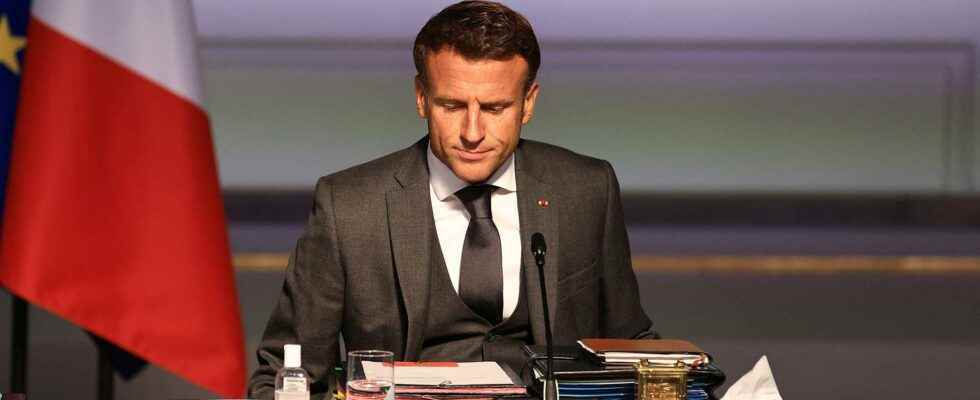The government was in full force on Wednesday, brought together by Emmanuel Macron and Elisabeth Borne. Roadmaps were sent to the ministers as well as “a list of 60 priority government policies, accompanied by specific objectives”.
“Transparency”, “listening”, “efficiency”: Emmanuel Macron and Elisabeth Borne brought together the entire government on Wednesday to set the strategy which will be guided by these three principles, with the difficult challenge of reconciling climate emergency, energy sobriety and defense of the purchasing power.
Roadmaps have been sent to the ministers, which will be made public, as well as “a list of 60 priority government policies, accompanied by specific objectives”, detailed the Prime Minister during a press conference organized at the outcome of the seminar. This brought together, after a brief council of ministers, the 42 members of the government, deputy ministers and secretaries of state included.
Ecological transition, full employment, sovereignty and equal opportunity are the four “battles” that the government intends to fight first. No timetable has been given on the delicate and controversial pension reform, but it is “not abandoned” and its “gradual deployment” would be carried out “during the year 2023”, assured the spokesperson of the government Olivier Véran.
According to a schedule detailed by Ms. Borne, the first texts presented to the Council of Ministers “during the month of September” will relate to unemployment insurance, the development of renewable energies, and the orientation and programming bill for the Ministry of the Interior (Lopmi). At the same time, Emmanuel Macron will set up his controversial “National Council for Refoundation” on September 8, which “will bring together some fifty representatives of our society and experts to shed light on the debate”, according to Ms. Borne.
“United” team
In 2023, the military programming law, a bill for the improvement of daily justice, another on energy-climate “to be broken down sector by sector”, texts on immigration, full employment, education and the Olympics.
While the head of state had demanded “very strong unity” from the government after a series of controversies during the summer, Ms. Borne hailed an “experienced and united” team.
In the morning the seminar had worked on the presentation of the priorities before examining the “fiscal and budgetary issues”, “the commitment to full employment” and “the government’s action in the face of the climate challenge”.
In this context, the government was able to hear a presentation by climatologist Valérie Masson-Delmotte, member of the IPCC, invited on the initiative of Emmanuel Macron. By exchanging with this recognized expert, “it is a question of each minister being able to understand the stakes, even if the climate is not directly in the attributions of his ministry”, explains the entourage of the president.
This priority has been hammered home in recent days by the president and then by Elisabeth Borne, who warned the bosses on Monday that it was necessary to “act faster and stronger” in the face of climate change and soaring energy prices, accentuated by the war in Ukraine.
No tax hikes
These subjects will again be on the menu of a Defense Council devoted Friday at the Elysée to the supply of gas and electricity to France.
There will be examined “the scenarios envisaged to prepare for all scenarios this fall and this winter”, according to an adviser to the Elysée.
Gas flows from Russia have dried up and the Europeans are preparing for a possible total shutdown, in retaliation for the sanctions imposed on Moscow since the invasion of Ukraine.
The situation is also tense on the electricity side, due to the unavailability of part of the nuclear fleet, in particular for corrosion problems.
Elisabeth Borne on Monday urged companies to act to improve their energy sobriety, otherwise they would be the “first affected” by “rationing” measures.
On these issues, the government is accused by part of the opposition, including environmentalists, of not doing enough and by another of over-dramatizing the situation or not enough “to protect the French”.
And Marine Le Pen wrote to Elisabeth Borne to request an extraordinary session of Parliament, questioning “the flagrant inefficiency of the government”.
“To make this observation is not to want to play with fears, it is not to handle arguments of authority, it is to be transparent about what we have to face together and it is to say how we We intend to take up these challenges”, pleaded Thursday Ms. Borne, who announced the holding of a parliamentary debate on energy policy.
